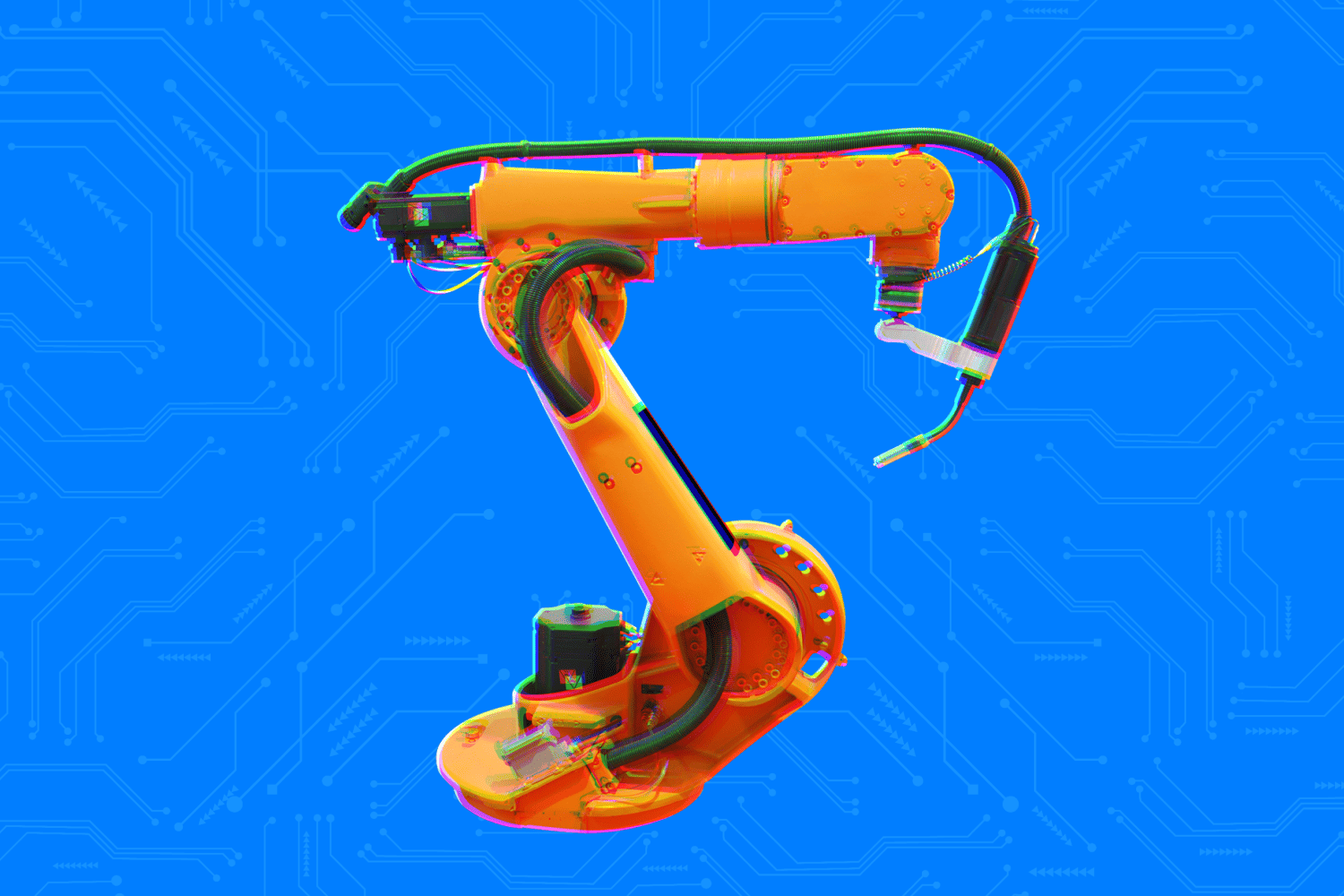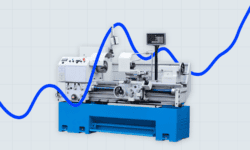Over the past year, generative artificial intelligence (genAI) has rapidly accelerated digital transformation around the globe due to AI tools like ChatGPT, Jasper, and Bard.
GenAI, a subset of artificial intelligence that utilizes natural language processing algorithms to generate videos, images, and text resembling its reference data, stands apart from other AI types. Instead of focusing on pattern detection, decision-making, analytics gathering, and data classification like traditional AI, genAI creates new content, chat responses, designs, and synthetic data.
It’s already made an extensive impact in various industries, from healthcare to consulting to financial services, and now, to manufacturing. The potential use cases are extensive—from product design and innovation, to quality control and inspection, predictive maintenance, supply chain optimization, and process optimization—genAI has the potential to completely revolutionize the manufacturing industry.
But what are the exact use cases for genAI within this sector? And does this new iteration of artificial intelligence pose potential risks for manufacturers? What does the future look like for such a new piece of technology—is it a long-lasting or short-lived trend? Below, we answer these pressing questions and more.
Generative AI Use Cases in Manufacturing
Like most industries wielding this new iteration of artificial intelligence, generative AI offers a wide range of use cases in the manufacturing sector. From reducing time to market and leveraging digital twin technology to driving innovation, enabling predictive maintenance, and enhancing decision-making, genAI has the potential to revolutionize the way manufacturers operate. By harnessing it, organizations can gain a competitive edge, improve efficiency, and deliver innovative AI solutions to meet the evolving needs of their customers.

Reducing Time to Market
One of the key benefits of using generative AI in the manufacturing industry is the ability to significantly reduce the time it takes to bring a product to market. By leveraging generative AI algorithms, manufacturers can automate and optimize various stages of product development, such as the design process, prototyping, and testing. This automation allows for faster iterations and improvements, ultimately accelerating the time it takes to launch a new product. With genAI, manufacturers can stay ahead of their competitors by quickly adapting to market demands and delivering innovative solutions in a timely manner.
For example, genAI can help manufacturers analyze data from sensors and equipment to predict maintenance needs. This helps extend the equipment’s lifespan and reduces unplanned maintenance costs, leading to smoother operations and minimal downtime.
Digital Twin Technology (Simulations)
GenAI enables the creation of digital twins—virtual replicas of physical assets or processes. By using generative AI algorithms for real-time data analysis from sensors and other sources, manufacturers can create accurate digital representations of their products, production lines, or entire factories.
“Large-scale manufacturers use digital twins to improve design, test new processes and create new products. Adding GenAI capabilities is a logical next step and a way to turbo-charge results.” reports Manufacturing Dive.
These digital twins can be used for simulations and predictive analysis, allowing manufacturers to optimize operations, identify potential issues, and test different scenarios without disrupting the production process. Digital twin technology powered by genAI provides manufacturers with valuable insights and the ability to make informed decisions to improve efficiency and productivity.
Increased Innovation
Generative AI has the potential to revolutionize the innovation process for manufacturing companies. By leveraging machine learning algorithms, this technology can analyze vast amounts of data, including market trends, customer preferences, and historical performance, to identify patterns and generate new ideas.
This can help manufacturers uncover innovative product designs, optimize manufacturing processes, and even discover new business models. Manufacturers can also tap into the power of data-driven innovation, enabling them to stay ahead of the competition and meet the evolving needs of their customers.
“It remains highly dynamic, the most dynamic large economy in the world, tons of investment going into an innovation like AI. There’s a lot of investment going into manufacturing capacity, really driven by industrial policy. We think this is going to propel productivity growth.”
– Expeditors International of Washington | Special Call
Predictive Maintenance
Predictive maintenance is another critical use case for generative AI within manufacturing. Analyzing real-time data from sensors and equipment allows generative AI algorithms to detect patterns and anomalies that indicate potential equipment failures or maintenance needs. This proactive approach allows manufacturers to schedule maintenance activities before a breakdown occurs, minimizing downtime and reducing costs associated with unplanned repairs. This capability not only improves equipment reliability but also optimizes maintenance schedules, leading to increased operational efficiency and cost savings.
Enhanced Decision-Making
GenAI can also significantly enhance decision-making processes for leadership. This technology’s ability to analyze vast amounts of historical data from various sources, including inventory management, market trends, and customer feedback, can provide valuable insights and recommendations. Additionally, these insights can help manufacturers optimize production planning, identify cost-effective opportunities, and streamline decision-making to improve overall business performance.
According to findings from Boston Consulting Group, one automotive supplier deployed genAI solutions which resulted in a 21% boost in productivity, with ROI observed between one to three years across various applications.
“One application was an AI-powered scrap adviser that provided operators with optimized parameters, cutting scrap rates by 25%. Another was a pump health monitor that nearly eliminated breakdowns of a critical production pump, enhancing overall equipment effectiveness by more than seven percentage points. A third application involved implementing an AI-driven visual quality inspection system that detected aesthetic defects in products.”
This genAI system reduced the need for quality control staff by 65% while improving the accuracy of the inspections.
Risks of GenAI in Manufacturing
GenAI adoption can offer numerous benefits, but it is important for manufacturing operations to be aware of and address the risks associated with integrating AI within their existing systems. From ethical considerations to data privacy and security, job displacement, compliance, operational, reputational, and regulatory risks, it’s essential that manufacturers proactively manage these potential threats. Doing so will allow leaders to harness the power of genAI while minimizing its potential negative impacts.
Integrating AI with Existing Legacy Systems and Processes
One of the risks associated with AI adoption in the manufacturing industry is the challenge of integrating AI technologies with existing legacy systems. Many organizations have established processes that have been in place for years, and introducing AI into this environment can be complex and time-consuming.
Ensuring compatibility of AI systems with legacy systems may require significant modifications or even a complete overhaul of existing infrastructure. This can result in disruptions to operations and potential downtime, which can impact productivity and profitability.
Ethical Considerations, Data Privacy and Security, Job Displacement
The ethical considerations, data privacy and security concerns, and the potential for job displacement are also “red flags” tied to genAI. As AI technologies become more advanced and capable of performing complex tasks, there is growing concern about the ethical implications of relying on AI systems in manufacturing processes.
Additionally, the collection and analysis of large amounts of datasets by AI systems raise concerns about data privacy and security. Manufacturing organizations need to ensure that appropriate measures are in place to protect sensitive information and comply with regulations.
Furthermore, the adoption of genAI in manufacturing may lead to job displacement. As AI systems automate certain tasks and processes, there is a possibility that some job roles may become redundant. This can result in workforce restructuring and potential job losses, which can have a negative impact on employee morale and the overall social impact of AI adoption in the manufacturing industry.
“Models have inherent biases that may amplify certain segments of data unduly, compromising the reliability of their conclusions,” McKinsey states. “This underscores that AI models are not an opportunity to abandon human responsibility; human operators must take a conscientious, active hand in their use.”
While generative AI promises to boast an unending stream of benefits for professionals, it’s crucial to understand the potential impact implementing these tools can have on your business. Download our infosheet, 4 Key Considerations for Generative AI in Market Research Workflows, to discover what you must look for in any genAI tool for reliable results.
Compliance, Operational, Reputational, and Regulatory Risks
The adoption of genAI in manufacturing also brings with it compliance, operational, reputational, and regulatory risks. Manufacturing organizations need to ensure that AI systems comply with industry regulations and standards. Failure to do so can result in legal and financial consequences.
Operational risks may arise from over-reliance on AI systems that are not properly tested or calibrated. Malfunctioning AI systems can lead to production schedule delays, product quality issues, and increased costs for supply chain management. Reputational risks can also arise if AI systems are perceived as unreliable or if they are associated with negative outcomes.
Lastly, regulatory risks may emerge as AI technologies continue to evolve. Governments and regulatory bodies are still developing guidelines and regulations around the use of AI in manufacturing. Manufacturing organizations need to stay informed and adapt to changing regulations to avoid potential penalties or legal issues.
In fact, PwC believes that regulatory solutions that already exist aren’t expensive enough and that lawmakers will have to work to create a genAI that is safer for all:
“The catalog of risks that concern regulators is long. More believable phishing emails and more convincing fake identities. Loss of control over personal data fed to models. Models’ data sources that are largely unknown and may include inaccurate and deliberately false content on the internet. Misuse of the models to create more and more realistic misinformation…”
“Existing regulations, such as the Global Data Protection Regulation and equal employment opportunity laws, already apply to aspects of GenAI. Other laws, such as the EU’s proposed AI Act, will need revisions to address the generative form of AI. In some cases, especially in the United States and China, new laws will be necessary to help close regulatory gaps exposed by GenAI uses.”
The Future of Generative AI in Manufacturing
There’s no denying that genAI is poised to transform the future of the manufacturing industry. With its ability to analyze vast amounts of data and generate valuable insights, genAI has the potential to revolutionize processes and drive innovation. Ultimately, the current outlook for genAI‘s influence and use in manufacturing is highly promising, with numerous benefits and use cases being explored.
However, as with any new technology, there are risks and challenges associated with genAI adoption in manufacturing. From potentially inaccurate or biased results if the algorithms and machine learning models are not properly trained or validated, to the displacement of human workers due to automation—genAI poses real risks for people and organizations. However, it is important to note that these potential problems can be mitigated.
With its ability to provide instant insights, optimize processes, and drive innovation, genAI truly has the potential to revolutionize the manufacturing industry. By embracing this technology and addressing the associated risks, manufacturing organizations can gain a competitive advantage in their respective sectors.
Stay Ahead of The Curve With AlphaSense
In a volatile market that’s producing new developments around genAI every day, it’s challenging to decipher what technology, product, or insight could impact the manufacturing industry next. Cutting through the noise to find insights is nearly impossible in the age of information overload. You need a tool that does all of the heavy lifting, so you can focus on leveraging information rather than searching for it.
AlphaSense is a leading provider of market intelligence, including 10,000+ high-quality content sources from more than 1,500 leading research providers—all in a single platform. Analysts, researchers, and decision-makers in the manufacturing sector can access exclusive research reports only found elsewhere in disparate locations and often behind expensive paywalls. Specific types of content you’ll find on the AlphaSense platform include:
- Industry news, company reports, 510(k) filings, and regulatory content
- Over 1,500 analyst research providers including Wall Street Insights®, a premier and exclusive equity research collection for corporate teams
- Expert call transcript library that gives access to tens of thousands of insightful interviews with manufacturing professionals, customers, competitors, and industry experts
The AlphaSense platform also delivers unmatched AI search capabilities and features for analyzing qualitative and quantitative research, and can mine unstructured data for the most critical insights, including:
- Automated and customizable alerts for tracking regulatory filings, companies, industries, and potential investments
- Table export tools that support M&A workflows like target lists and due diligence
- Smart Synonyms™ technology that ensures you never miss a source important to your research
- Smart Summaries, our first generative AI feature, summarizes key insights from earnings calls for faster analysis
Stay ahead of the rapidly evolving manufacturing landscape and get your competitive edge with AlphaSense. Start your free trial today.
.png)







